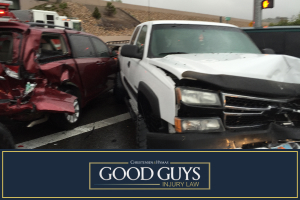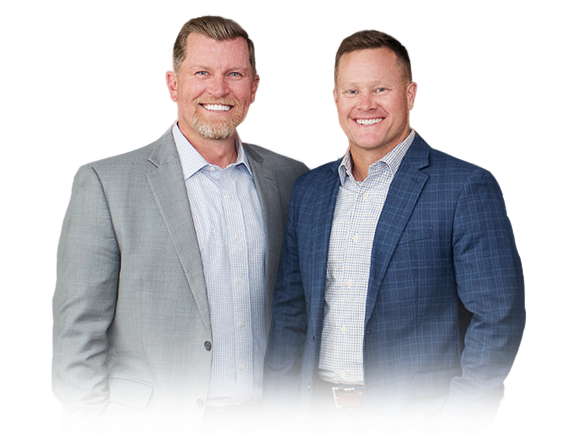
Admitting fault after a car accident in Utah can have significant consequences. It’s a natural reaction to want to apologize or accept blame, especially if you think you’re at fault. However, it’s crucial to understand that admitting fault can impact your legal and financial situation.
At Good Guys Injury Law, we know that car accidents in Utah can be devastating. After an auto accident, you need a copy of the police report to determine the at-fault driver. Our car accident lawyers are available to aid you in pursuing compensation through a personal injury claim or insurance claim. We can even negotiate with your own insurance company on your behalf.
Learn more about personal injury protection and insurance coverage below. Then, contact us to explore compensation for your medical bills after a car crash.
Table of Contents
Understanding the Implications of Admitting Fault
When you admit fault at the scene of a car wreck, it can set the tone for everything that follows. This admission can be used against you in legal proceedings and insurance claims. In Utah, where fault is key in determining liability, such statements can be particularly impactful. It’s best to avoid making any admissions until you fully understand the situation.
Legal Consequences of Acknowledging Responsibility
Acknowledging responsibility for a car accident can lead to legal challenges in Utah. If you admit fault, you might find yourself legally liable for damages and injuries resulting from the accident. This could mean paying for repairs, medical expenses, and even facing lawsuits. It’s a situation that can become complicated and costly.
Utah law considers the statements you make at the accident scene when determining fault. Even a simple apology can be understood as an admission of liability. This can critically affect the outcome of any legal actions taken against you. Therefore, being mindful of your words following a car accident is crucial.
Impact on Insurance Claims and Premiums
Admitting fault can also affect your insurance claims. If you’re found at fault, your insurance company may have to pay for the damages, leading to higher insurance premiums. This financial impact can be significant and long-lasting. It’s important to let insurance adjusters investigate and determine fault based on evidence, not admissions.
Your admission of fault can lead to a straightforward claim process for the other party involved. However, this can be disadvantageous, as it may limit your ability to recover compensation for any damages or injuries you suffered. Insurance companies often use admissions of fault to decide how to handle claims, so speaking carefully and factually about the accident is wise.
The Role of Comparative Negligence in Utah
Utah follows a comparative negligence system. This means that if you’re partially responsible for an accident, your ability to recover damages can be reduced. For example, if you’re found to be 30% responsible for an accident, your compensation can be reduced by 30%. Admitting fault can inadvertently influence this percentage, potentially reducing the compensation you might receive.
In cases where multiple parties share the fault, Utah’s comparative negligence system can complicate the determination of fault and compensation. Your admission of fault can tip the scales, possibly to your disadvantage. It’s important to understand that the allocation of fault isn’t always clear-cut and can be influenced by various factors.
Why It’s Important to Avoid Immediate Fault Admission

- Preserve Your Legal Rights: By not admitting fault immediately to the other driver, you preserve your legal rights. You give yourself time to understand the situation and seek legal advice. This cautious approach can protect your interests in any subsequent legal proceedings.
- Wait for a Full Investigation: Accidents often have complex causes that aren’t immediately apparent. It’s essential to wait for a full investigation by police and insurance companies. These investigations can reveal details that significantly affect who is at fault.
- Avoid Misinterpretation: What you say at the accident scene can be misinterpreted. Even a good-natured apology can be taken as an admission of guilt. Staying neutral in your statements helps avoid misunderstandings about your role in the accident.
- Impact on Insurance Claims: Admitting fault can simplify the claim process for the other party but complicate it for you. It’s best to let insurance adjusters determine fault based on evidence, not on admissions made at the scene.
- Legal and Financial Protections: Avoiding immediate fault admission protects you legally and financially. It prevents making a statement that could be used against you in a lawsuit or in determining insurance liabilities.
How Statements at the Accident Scene Can Affect Your Case
What you say at the scene of a car accident in Utah can greatly impact your case. It’s important to be careful with your words. Even statements meant to be sympathetic can be construed as admissions of fault. Your words can be used as evidence in both legal and insurance proceedings.
It’s easy to say something without thinking in the tense moments following an accident. However, these statements can shape the narrative of the accident. They can influence how insurance companies and lawyers view your role in the event. It’s best to limit your conversation to exchanging necessary information and avoid discussing the details of the accident.
The Role of Evidence in Determining Fault in Utah

In Utah, evidence is key to determining fault in a car crash. This can cover everything from photographs of the scene to witness statements and police reports. This evidence is used to reconstruct what happened and establish who is responsible. They provide a more objective view of the accident than personal statements.
Gathering evidence should be a priority after an accident. It’s important to document the scene as much as possible. Take photos of the vehicles, the road conditions, and any relevant signs or signals. This evidence can be invaluable in establishing the facts of the case and protecting your interests.
Consulting with a Legal Expert Before Admitting Fault
Before admitting fault in a car accident, it’s wise to consult with a legal expert. A lawyer can help you understand and interpret your rights and the implications of any statements you make. They can provide you guidance in navigating the post-accident process, ensuring your interests are protected.
A lawyer can also help interpret the evidence and determine the best course of action. They can give you advice on negotiating with insurance companies. They can also negotiate with anyone else involved in the accident.
Insurance Company Interactions: What to Say and What Not to Say

When interacting with insurance companies after a car accident in Utah, it’s important to be cautious with your words. While you need to report the accident, you should avoid making definitive statements about fault or responsibility. Stick to the facts and let the insurance adjusters do their job.
What To Say
When talking to your insurance company, provide factual information about the accident. This includes the time, location, and a description of what happened. Be honest, but don’t speculate about fault or make assumptions. It’s also important to report any injuries or damages accurately.
Follow up with your insurance company to ensure they have all the necessary information. Keep records of all your communications and any documents you provide. Being organized and thorough can help expedite the claims process and ensure your case is handled correctly.
What Not To Say
Do not make any statements that could be interpreted as admitting fault. This includes apologies or comments that imply you were responsible for the accident. Also, don’t guess or speculate about the cause of the accident. Stick to what you know and avoid offering opinions.
Think twice about giving a recorded statement to the other party’s insurance company. They may use your words against you in settling the claim. If you’re unsure about what to say, consult with your attorney before providing any statements.
Understanding Utah’s Accident Reporting Requirements
In Utah, you’re required to report any car accident that leads to injury, death, or significant property damage. This report is typically filed with the police at the accident scene. Failing to report an accident can result in legal penalties, so complying with this requirement is important.
The accident report is an important document in any legal or insurance proceedings. It provides an official event record and includes details crucial for determining fault and liability. Make sure you obtain a copy of the report. Your lawyer will ask for this during the meeting.
When and How to Discuss the Accident with an Attorney
After a car accident in Utah, discussing the event with an attorney is a good idea. A lawyer can go through your rights and the legal implications of the accident. They can also advise you on how to proceed with insurance claims and any potential legal action.
When meeting with your attorney, bring any documentation you have, including the accident report, photos, and insurance information. This information will help your attorney provide the best possible advice and representation.
Call Good Guys Injury Law After a Utah Car Accident

If you’re involved in a car accident in Utah, Good Guys Injury Law is here to help. Our legal experts understand the difficulties of auto accident accident cases and are dedicated to protecting your rights. We can guide you through the legal process.
Contact us today for a consultation. We’ll review your case, provide expert legal advice, and represent your interests every step of the way. Our goal is to ensure that you receive the fair treatment and compensation you deserve.





